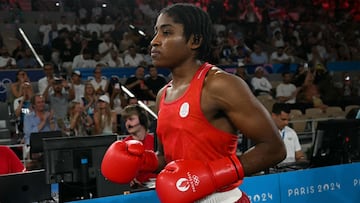Who is Cindy Ngamba, the first ever medalist for the Refugee Olympic Team?
Despite losing in the semifinal to Panama’s Atheyna Bylon, Ngama made history at the 2024 Olympic Games in Paris.


Boxer Cindy Ngamba has made history at the 2024 Olympic Games in Paris by becoming the first ever representative of the Refugee Olympic Team to win a medal.
The 25-year-old was defeated in the semifinals of the women’s 75kg category by Atheyna Bylon of Panama but still clinched a bronze medal, with boxing one of several combat sports not to feature a bronze medal match, instead awarding one each to the beaten semifinalists.
Ngamba was born in Douala, the capital of Cameroon, in September 1998 but fled to the United Kingdom at the age of 10, and has been there ever since.
The Refugee Olympic Team is incredibly proud of Cindy Ngamba, the first EOR athlete and the first-ever refugee medallist at the Olympics.
— Refugee Olympic Team (@RefugeesOlympic) August 8, 2024
This bronze medal is a victory #ForThe100Million displaced people worldwide. Today, we are speechless.
Cindy did it. Refugees did it! 🫶… pic.twitter.com/Nu0ZriEu3J
Why can’t Cindy Ngamba represent Great Britain in the Olympics?
She went to school in Bolton, in the northwest of England, earned a degree in criminology at university and now trains at Team GB gym at the English Institute of Sport in Sheffield, although she can’t represent Great Britain at the Olympics as she doesn’t have a British passport or citizenship, which she is fighting to obtain.
Five years ago, Ngamba was almost deported after being arrested and sent to a detention camp in London upon attending what she thought was a process to let authorities know she was still in the UK. Her uncle, who works for the British government in Paris, helped ensure she was released.
Ngamba could have found herself being sent back to Cameroon a decade on, a country she is unable to set foot in because of her sexuality. Homosexuality there is punishable with up to five years in prison. Thankfully, it didn’t come to that.
HISTORY MAKER ❤️
— Eurosport (@eurosport) August 8, 2024
Cindy Ngamba becomes the first Refugee Team athlete to secure an Olympic medal, winning bronze in the Women's Middleweight boxing 🥉👏#Paris2024 #Olympics #Homecrowd pic.twitter.com/h2skTiOLdR
What is the Refugee Olympic Team?
Since it’s introduction at the 2016 Games in Rio de Janeiro, the Refugee Olympic Team has brought together displaced and disenfranchised athletes from around the world to give them the chance to compete against the best on the planet. These refugee athletes are elite competitors and undergo a tough qualification process to bag one of few spots on the Refugee Olympic Team.
Related stories
Each of the athletes involved in the Refugee Olympic Team are refugees in a host nation other than their native country. Their refugee status must be recognised by UNCHR, the UN Refugee Agency.
This year’s Refugee Olympic Team is significantly larger than either of the two previous iterations, bringing together 36 athletes hosted by 15 different National Olympic Committees. Those athletes will compete across 12 sports, of which athletics is the most common.


Complete your personal details to comment